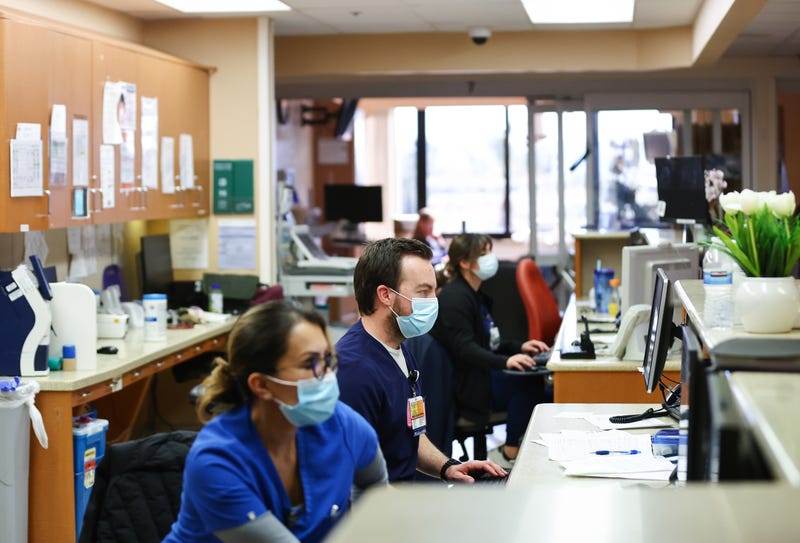
Buffalo, N.Y. (WBEN) - As of Sunday across New York State, COVID-19-related masking requirements for staff and visitors in hospitals and other healthcare facilities were allowed to expire.

The decision from state health officials this past Thursday comes as governments continue to adjust to current life with COVID-19 and relax rules enacted during the most intense days of the pandemic.
Health officials advised hospitals, nursing homes, treatment centers and other healthcare facilities to enact their own masking rules in accordance with guidance form the Centers for Disease Control.
"What CDC guidance says is that mask usage depends on transmission level, and presently here in Erie County, we're still at a high transmission level and test positivity rate. And as a result, CDC recommends mask use in healthcare facilities," said Dr. Thomas Russo, Professor and Chief of Infectious Disease at the University at Buffalo Jacobs School of Medicine and Biomedical Sciences. "Presently, that's what our healthcare facilities are doing. They're carrying on with mask use until cases drop to a lower levels."
Although transmission rates and test positivity rates continue to remain at a higher level in Erie County, this decision from state health officials did not come as a surprise for medical experts in the region.
"I think it was reasonable, given the fact that the virus has either infected most of the population, or in fact, the person has been immunized. There's a fair amount of immunity already," said Dr. Nancy Nielsen, Senior Associate Dean for Health Policy at the Jacobs School of Medicine and Biomedical Sciences. "I don't think it's necessary for all visitors, for example, to a hospital or to a healthcare facility to wear masks. That will be left up to the facility, and they can make that decision based on how much virus there is in the community. And frankly, this time of year, we have more than COVID circulating, we have influenza as well. So they're going to be people and entities that want to wear masks, even though they're not forced to, so I think it was a reasonable decision."
"I think what this says is though we still have a lot of COVID, we're not out of this mess yet, we are heading in the right direction," Dr. Russo added. "This particular change will then set the stage so when cases get to lower levels, hospitals will have the option to do what they think is best for their own facility."
While we're just a couple of days out from this change in policy at the state level, experts feel once the transmission and test positivity levels in Erie County come down to a safe enough level, it will be time to transition to living life with COVID-19 in hospitals.
"I think we just simply [need to] be prepared with masks, if we need them, and if the facilities have some reason to require it, they will say so when you get there," Dr. Nielsen said. "Most everybody has masks now, I keep some in my car. So it's not a big deal. And frankly, anybody who is ill should either stay at home or, if they have to go out, they certainly should be masked."
"To be clear, if someone is admitted in the hospital and has COVID, or someone has had a close contact and has a high risk of developing COVID, I'm sure there'll be individual situations where mask use will still be the order of the day. But it does give them that flexibility when cases are low in other types of situations," added Dr. Russo.
As for the timing of the decision from New York State, both Dr. Nielsen and Dr. Russo feel it was reasonable for this requirement to lapse. While Erie County may be seeing higher levels of transmission and positivity rates at this time, other areas across the state are already seeing safe enough levels to not warrant a masking requirement at facilities.
"I think that it's OK making this change now, as long as the situation is not misconstrued and this change, everyone feels masks are no longer being used in healthcare settings," Dr. Russo said. "Unfortunately, that is not the case here in Erie County, due to the magnitude of cases and percent of test positivity that we presently have."
Meanwhile, the federal public health emergency declaration for COVID-19 is set to come to an end on May 11. When that emergency declaration ends, things like testing and vaccines will no longer be free to the public anymore. Dr. Nielsen wants to be sure people remember that and are prepared to make sure either they have insurance, or they have money to cover the cost of the testing and vaccine, if needed.
"If you don't have any home testing, you might want to get some while they're still free, because after May 11, they're not going to be," she said. "And certainly if you haven't been immunized, you should be and get that done before May 11, as well."
When the time comes for hospitals and other healthcare facilities in Western New York to safely allow for masking requirements to be lifted, some have questioned whether or not facilities would make a masking policy permanent, or if it may become a seasonal policy when cold/flu/COVID season starts to ramp up every fall.
Experts like Dr. Russo and Dr. Nielsen are awaiting the day when COVID-19 becomes more of a seasonal illness, allowing for that potential for hospitals to decide their own policies for a change.
"I think we will be in the situation where facilities, themselves, will be able to make that decision, and I do think it's going to be much more a winter time situation," Dr. Nielsen said. "However, if you remember, we certainly had peaks of COVID during the summer. It's not going to only be winter, but it will be very much what's the infectivity in the community at the time."
"For the last three years, we've had COVID year-round. It would be nice if, similar to influenza, COVID just becomes seasonal. That will not only help us in terms of gearing up for, perhaps, boosters once a year, but also it gives us mask use at select the times of year as well. So we'll just have to see how this plays out," added Dr. Russo. "I do anticipate as our immunity continues to build - this assumes some new variant doesn't arise that invades that immunity and cause a serious disease - that we will have times of year where cases are extraordinarily low and we could safely forego the use of mass, at least, in most healthcare settings with the exceptions of when we deal with infected patients."


